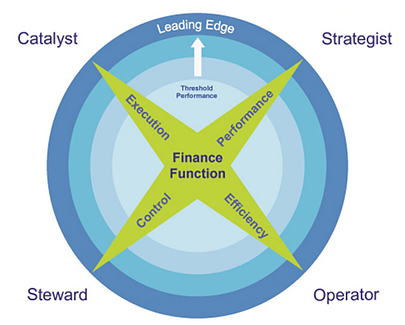Chief Financial Officers, or CFOs, have been commonly known as a corporate officer who’s responsible for managing the organisation’s financial risk, financial planning and reporting to higher management board. However, in this new era, the role of CFO is no longer limited to the tasks above. As stated in a recent study by Accenture, 70% of correlation is found between high-performing financial departments and high-performing companies. This means the CFOs’ responsibility has evolved. Additional research also indicated that CFOs’ responsibilities have been changed from being a rear-view mirror perspective provider to a strategic advisor who navigates the business through hard times and shapes the company’s direction.

The evolving responsibilities of CFOs
CFOs nowadays are operating in a dynamic and challenging world that requires changes almost every day to guide the business on the right path to success. Recent report from Deloitte & Touche LLP categorised CFO’s roles into 4 main functions that significantly expanded their traditional role discussed above. Below are the four new roles of modern CFOs:

Steward: Accounting, control, risk management, and asset preservation are the province of the steward, who must ensure company compliance with financial reporting and control requirements.
Operator: Efficiency and service levels are the primary areas of focus for the operator, who must dynamically balance cost and service levels in delivering on the finance organisation’s responsibilities, and adapt finance’s operating model as necessary.
Strategist: The strategist helps define the future of the company to enhance business performance and shareholder value while providing a financial perspective on innovation and profitable growth.
Catalyst: The catalyst is an agent for change who strives to attain business alignment and serves as a business partner to other decision makers, including business unit leaders, the chief information officer, and sales and marketing leaders.
Steward and Operator roles are to control and enhance the efficiency, which is more to the traditional responsibilities of CFOs, while Catalyst and Strategist represent the ‘trusted advisors’ attributes to other members.
Besides the traditional expectations on finance functions that Steward and Operator represent; nowadays, CFOs also play a more important role as a Catalyst and Strategist to other members in the C-suite. They help the organisation to ensure all plans are on the right way, all initiatives are supported by proper analysis and all activities will be performed in expected levels.
This leads to an underlying question: “what drives this evolution?” The answer reveals deeper level of understanding of new CFOs’ must-meet objectives. Although there are many factors that affect the whole situation, the major cause is volatility among CFOs.
So, why volatility?
The drivers of CFOs’ volatility
The first driver of volatility is the decrease in CFO’s confidence level due to on-going economic concerns. In the UK and North America, CFO optimism dropped dramatically, with limited confidence to the organisational sustainability in the upcoming year. The situation is somewhat more positive in the Middle East and Asia-Pacific. However the confident rates are relatively low with more than 50% compared to 72% in Middle-East, 31% and 16% in India and Australia respectively. Additionally, the level of business uncertainty hit its ceiling number in more than a year in Australia.
Increase consolidation is the second driver of volatility, although in some cases this is also a side effect of economic crisis. According to the same survey, merger and acquisition activities occurred across industries, with total of $86 billion for 369 deals in 2011, with more than half was spent on unconventional resource asset deals. This record continued to rise in 2012.
One last area of volatility that we must not overlook is technology. It can be a valuable asset or an unwelcomed obstacle when organisations want to adapt technology to changing needs. As the business needs are changed and finance department roles are evolved, companies then found almost all dated technologies were outdated and cannot help them to meet the evolving requirements. At the same time, new technologies such as mobility, cloud, social media, big data are developing independently, making businesses adopt them before they are fully fit in the organisation. These four categories are described as the “nexus forces” that will result in new information patterns and business scenarios.
CFOs’ roles, besides the traditional responsibilities of keeping financial reports on track, also expand to take both financial department but also the whole business, through identifying new technology platforms that works, into the future.
This is the first post in the series “How to make technology a new catalyst for high-performance finance”. Stay tuned to our next posts “4 evolutionary scales and tools to maximise finance team’s performance” to discover what’s more of CFO in organisation.
Or find out more in our related posts:
 English
English  Vietnamese
Vietnamese 


